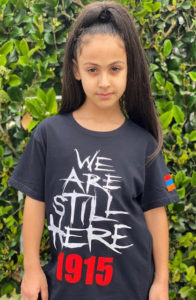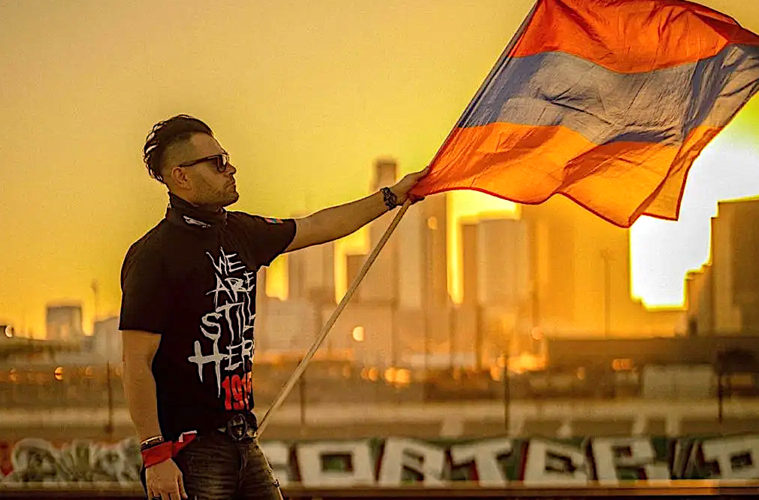If you’re in and around Glendale and certain parts of Los Angeles during the month of April, you’re likely to see Armenian flags on cars and in windows of local businesses in commemoration of the Armenian Genocide. You also might notice the phrase Our Wounds Are Still Open: 1915 printed on T-shirts, hoodies, caps, signs and decals.
Armenians march and wave flags every year on April 24 to bring attention to the killing and ethnic cleansing of their people (over a million) by the Turks of the Ottoman Empire during World War 1. But even if you know this history, you might wonder about the meaning and origin of these words now written everywhere.
Los Angeles locals R-Mean, Tina Chuldzhyan and Alex Kodo are behind the clothing line and slogan, taken from one of rapper R-Mean’s lyrics. What started as a rap song written 15 years ago about the Turkish government’s denial of the genocide has now become a popular, politically-inspired streetwear line, and a rallying cry for youth in the Armenian community and beyond.

(Courtesy Pentagon LA)
Born Armin Hariri to an Armenian-Persian mother and a Baha’i Persian father in L.A., R-Mean grew up just outside of Amsterdam before moving back here in 2004. He rapped as a hobby in high school. In 2006, he released his first record, Broken Water, which included the song “Open Wounds”- (“We’re praying to God to make ‘em admit it – we’re still hoping / But they still won’t and that’s why these wounds are still open”).
R-Mean has since recorded six albums and projects on his label Pentagon Records. In 2013, he re-released “Open Wounds” and shot a video wearing a black T-shirt with the wordage design written in white slash-style font with the letters R, I and P in red.
“Everyone started asking us, ‘Where can we get that shirt in the video?’” R-Mean shares with L.A. Weekly. “We would get stopped every single time. It became a tool to educate people.”
The rapper, Chuldzhyan and Kodo, along with a graphic artist, conceived of the design as a “conversation piece,” but in an intentionally subtle way that was meant to address all social and historical – even personal – injustices.

(Courtesy Pentagon LA)
“We want it to be universal,” explains R-Mean. “It’s about crimes against humanity. I remember a guy in New York who had a tattoo of the logo, but with the year his sister was killed. People make it their own. It’s relatable.”
“It’s an empowering way of saying who we are without being obnoxious about it,” adds Chuldzhyan.
The T-shirts took off with R-Mean’s fans and on his website, and soon dozens of neighborhood shops started carrying them. Currently some 60 stores in L.A. sell the T-shirts around April, and profits from sales benefit the Open Wounds 1915 nonprofit, which in turn collaborates with many other Armenian organizations around the world.
In 2017, R-Mean, Chuldzhyan and Kodo opened The Pentagon LA retail space in Glendale, selling hip-hop-themed apparel, many with patriotic, Armenian images on them, as well as an “LA” logo design also created by the trio.

(Courtesy Pentagon LA)
From keffiyeh scarves and Che Guevara shirts to anti-Trump pink “pussyhats,” clothing and activism have always gone hand in hand. Nothing connects young people to a cause faster these days than integrating fashion and hip-hop.
“Having speeches by professors at commemorations is boring and not enough,” says R-Mean. “Sometimes you can spread a message so much better through art, music and movies. It was time to do something different. People need to look outside the box.”
The three even enlisted help from celebrities. The Game, Cardi B, Post Malone, DMX, Xzibit and other hip-hop heavyweights have all been photographed on social media either wearing or holding the T-shirt. (The designers shared a video of DMX wearing the shirt on their Instagram just last week following his death.)
“She actually had a full conversation with us about it,” remembers Chuldzhyan of Cardi B. “She’s a history buff. She was really inclined. That photo got spread all over social media, and you can’t pay for that kind of advertising.”
The store displays framed covers of hip-hop albums on its walls in addition to works by artists Shepard Fairey, Van Saro and former L.A. Weekly cover subject Robert Vargas, who recently painted the Eddie Van Halen mural in Hollywood, and is currently creating what will become the largest mural by a single artist in Downtown. With a pool table and basketball hoop in the front, the space also functioned as a sort of hang out, hosting pop-up events for other rappers and local designers, until it shut down in March 2020 due to COVID-19.
L.A. saw more business closures than any city in the U.S. during lockdown – approximately 15,000 across L.A. County. Like many small businesses hit by the pandemic, Pentagon LA sustained itself with online sales.
“We had to really shift our gears and work online,” says Chuldzhyan. “It was really tough being able to afford having employees again when you haven’t had a high level of sales anymore. Our online community and our music helped us heavily during this time. If we didn’t have those we wouldn’t have survived. I feel bad for businesses who were just starting out because they were the ones who got hit the hardest.”
In September, Azerbaijan launched a military attack on Artsakh, a small, long-disputed region in the South Caucasus, also known as Nagorno-Karabakh, that’s recognized as part of Azerbaijan, but is mostly populated by ethnic Armenians. The conflict killed thousands of soldiers and civilians and displaced many residents, leading to protests by Armenians all over the world. A ceasefire agreement was reached in November.
Though they were still dealing with COVID, R-Mean and his co-owners responded by turning their store into a drop-off station, collecting $500,000 dollars’ worth of donations for local charity Armenia Fund (armeniafund.org). “We were head to ceiling in boxes,” recalls Chuldzhyan. “We bound together as a community and it helped a lot.”

(Courtesy Pentagon LA)
Before the shop reopened in February, R-Mean continued releasing new music during quarantine, including a duet with Capital Cities singer Sebu Simonian and a collaboration called Armenian Emcee Cypher 2020, which includes several other local Armenian rappers and System of a Down bassist Shavo Odadjian. He also recorded “King James,” a LeBron James-inspired track produced by Scott Storch and featuring rapper Jeremih, which was used on an ESPN commercial.
R-Mean also started the #ArmeniansforBlackLivesMatter hashtag on social media with Mihran Kirakosian, a dancer who’s toured with Madonna and Britney Spears, as a show of solidarity for BLM and the struggle for racial justice in the wake of George Floyd’s death.
“We wanted to show the youth in our community that we’re standing up for any kind of injustice, not just our own,” R-Mean, whose other designs include the words We Are Still Here and just the year 1915. “We’re showing the African American community that we’re really behind them. I’m a hip-hop artist and he’s a dancer, and obviously we’ve been influenced by hip-hop. It’s been a big part of our lives. It was only right that we speak up and do whatever we could.”
The Pentagon LA, 1207 W. Glenoaks Blvd., Glendale. (818) 523-3803, thepentagonla.com and openwounds1915.com
Advertising disclosure: We may receive compensation for some of the links in our stories. Thank you for supporting LA Weekly and our advertisers.

